How our brave soldiers protect our frontiers and what kind of hardships they face in that job, what’s the price they pay in serving the motherland and what’s the price paid by their families and beloveds, is something completely known to the involved ones only, i.e., the Indian soldiers and their families left behind when they are on the war-front. But there is one more person in India who can be considered as knowing these facts very well. And that man is filmmaker J.P. Dutta who had lost his brother Deepak in the Indo-Pak war of 1971. Perhaps his brother’s sacrifice inspires and energizes him to make war-based movies. In my view, there are only three war-based movies made in Bollywood which can be considered as highly authentic, passionately made and praiseworthy. The first one is Chetan Anand’s Haqeeqat (1964), an immortal movie made on the Indo-China war of 1962. The credit for the other two goes to J.P. Dutta only who made first Border (1997) based on the famous Battle of Loungewala during the Indo-Pak war of 1971 and six years later, he came up with LOC Kargil (2003) which, true to its title, is based on the war between the infiltrators backed by the Pakistan army and the brave Indian soldiers in the hilly region of Kargil (Kashmir).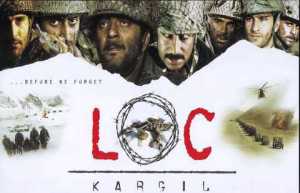 On the midnight of 14th August, 1947, India got partitioned and a perennial enemy started to exist in her neighbourhood, i.e., Pakistan. Pakistan fought three wars with India, the first one within a couple of months of its birth only, i.e., in October 1947. When the Kabaayalis who were none else than the Pakistani soldiers only, were defeated and driven out by the Indian army, a ceasefire line was drawn which divided the region of Kashmir into two parts. One part is still known as Pak-occupied-Kashmir (POK) and the other one is in India since then. That ceasefire line is commonly known as Line of Control (LOC). The issue was taken to the United Nations and it is still unresolved. The Indian army has been given strict instructions never to cross the LOC in any condition but its sanctity has been time and again violated by the Pakistani soldiers since the very outset.
On the midnight of 14th August, 1947, India got partitioned and a perennial enemy started to exist in her neighbourhood, i.e., Pakistan. Pakistan fought three wars with India, the first one within a couple of months of its birth only, i.e., in October 1947. When the Kabaayalis who were none else than the Pakistani soldiers only, were defeated and driven out by the Indian army, a ceasefire line was drawn which divided the region of Kashmir into two parts. One part is still known as Pak-occupied-Kashmir (POK) and the other one is in India since then. That ceasefire line is commonly known as Line of Control (LOC). The issue was taken to the United Nations and it is still unresolved. The Indian army has been given strict instructions never to cross the LOC in any condition but its sanctity has been time and again violated by the Pakistani soldiers since the very outset.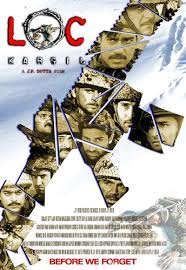 In 1999, under the scheme of General Parvez Musharraf, our perennial enemy backstabbed us and Pakistani soldiers crossed the LOC in the disguise of civilian infiltrators. Some of the regular patrol parties of Indian soldiers including young soldiers like Captain Saurabh Kaalia and Captain Amit Bhaardwaaj went missing and later on, the damaged corpses of our young soldiers were found. And then the eyes of the sleeping Indian politicians and the intelligence bureau got opened to the fact that there had been large scale illegal infiltration on our soil from the other side of the LOC. An undeclared war formally started which lasted for around 50 days and we lost several precious lives of Indian soldiers. The war had to be won in the end and we won it but the price that had been paid was just too much. Still we could not gain what we should have gained in the end because our soldiers were prohibited to cross the LOC in any condition. And due to lack of political will, we lost a golden opportunity to get POK liberated and correct the historical error of 1947.
In 1999, under the scheme of General Parvez Musharraf, our perennial enemy backstabbed us and Pakistani soldiers crossed the LOC in the disguise of civilian infiltrators. Some of the regular patrol parties of Indian soldiers including young soldiers like Captain Saurabh Kaalia and Captain Amit Bhaardwaaj went missing and later on, the damaged corpses of our young soldiers were found. And then the eyes of the sleeping Indian politicians and the intelligence bureau got opened to the fact that there had been large scale illegal infiltration on our soil from the other side of the LOC. An undeclared war formally started which lasted for around 50 days and we lost several precious lives of Indian soldiers. The war had to be won in the end and we won it but the price that had been paid was just too much. Still we could not gain what we should have gained in the end because our soldiers were prohibited to cross the LOC in any condition. And due to lack of political will, we lost a golden opportunity to get POK liberated and correct the historical error of 1947. The memory of the Indian masses is short and we very easily forget the sacrifices of the sacrificing ones and get back to our routines of earning a living. Hence, J.P. Dutta tagged the line to the title of this movie -‘BEFORE WE FORGET’. Yes, he did an exemplary thing by making this movie before the invaluable sacrifices of the young bravehearts were forgotten by the Indian public. Mr. Dutta used real locations and even real ammunition to shoot this movie. And thereby he has brought the passionate and emotional tales of the real Indian soldiers like Lieutenant Vikram Batra, Lieutenant Manoj Pandey, Captain Anuj Nayyar, Major Rajesh Adhikari, Major Padmapani Aacharya, Lieutenant Colonel R. Vishwanathan, Captain Vijayant Thaapar, Sepoy Yogendra Singh etc. alive on the screen. All the small and big tales with less footage to some and more footage to some other, are real and sensitive to the hilt. I watched this movie in its complete form (more than four hours) on a pirated VCD first and thereafter in the moth-eaten form (less than three hours) in the theatre with my friend – Mr. P.L. Prajapati in the Aakash cinema of Kota. The scenes of sacrifices of Major Rajesh Adhikari (Karan Nath) and Captain Vijayant Thaapar (Amar Upadhyaay) made me burst into tears in the theatre.
The memory of the Indian masses is short and we very easily forget the sacrifices of the sacrificing ones and get back to our routines of earning a living. Hence, J.P. Dutta tagged the line to the title of this movie -‘BEFORE WE FORGET’. Yes, he did an exemplary thing by making this movie before the invaluable sacrifices of the young bravehearts were forgotten by the Indian public. Mr. Dutta used real locations and even real ammunition to shoot this movie. And thereby he has brought the passionate and emotional tales of the real Indian soldiers like Lieutenant Vikram Batra, Lieutenant Manoj Pandey, Captain Anuj Nayyar, Major Rajesh Adhikari, Major Padmapani Aacharya, Lieutenant Colonel R. Vishwanathan, Captain Vijayant Thaapar, Sepoy Yogendra Singh etc. alive on the screen. All the small and big tales with less footage to some and more footage to some other, are real and sensitive to the hilt. I watched this movie in its complete form (more than four hours) on a pirated VCD first and thereafter in the moth-eaten form (less than three hours) in the theatre with my friend – Mr. P.L. Prajapati in the Aakash cinema of Kota. The scenes of sacrifices of Major Rajesh Adhikari (Karan Nath) and Captain Vijayant Thaapar (Amar Upadhyaay) made me burst into tears in the theatre.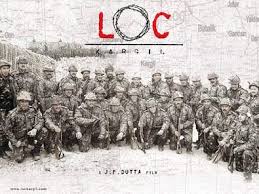 Mr. Dutta has presented everything with utmost authenticity on the screen which shows his deep research work in this regard. He has brought that period of May-July 1999 alive on the screen. A great effort indeed which entitles him for a big hand by the audience. Besides, he has been able to extract exemplary performances from the complete cast. Whether the role is a smaller one (like that of Himanshu Mallik) or a bigger one (like that of Ajay Devgan), everybody has given nothing short of his best. May it be Sanjay Dutt, Abhishek Bachchan or Saif Ali Khan or Manoj Bajpai or Akshay Khanna or Sunil Shetty or Sudesh Berry or anyone else, everybody has excelled. Ashutosh Rana has generated smiles and laughs too in this otherwise serious movie. However I feel, Raj Babbar and Mohnish Behl were miscast in the movie and J.P. Dutta should have included actors like Kulbhushan Kharbanda and Puneet Issar in his cast. Females did not have much to do. Nevertheless all have done well. Esha Deol, Kareena Kapoor and Rani Mukherjee have got some footage whereas actresses like Aakanksha, Divya Dutta and the actress who played the role of the wife of Hawaldaar Bahadur (Puru Rajkumar) have barely got the screen time that gets consumed in just a blink. All the same, everyone has given her best with utmost sincerity and dedication that’s required for the character assigned. The best female performer is undoubtedly, Maya Alagh. This veteran actress has delivered a highly impressive and touching performance as the mother of Lieutenant Manoj Pandey (Ajay Devgan).
Mr. Dutta has presented everything with utmost authenticity on the screen which shows his deep research work in this regard. He has brought that period of May-July 1999 alive on the screen. A great effort indeed which entitles him for a big hand by the audience. Besides, he has been able to extract exemplary performances from the complete cast. Whether the role is a smaller one (like that of Himanshu Mallik) or a bigger one (like that of Ajay Devgan), everybody has given nothing short of his best. May it be Sanjay Dutt, Abhishek Bachchan or Saif Ali Khan or Manoj Bajpai or Akshay Khanna or Sunil Shetty or Sudesh Berry or anyone else, everybody has excelled. Ashutosh Rana has generated smiles and laughs too in this otherwise serious movie. However I feel, Raj Babbar and Mohnish Behl were miscast in the movie and J.P. Dutta should have included actors like Kulbhushan Kharbanda and Puneet Issar in his cast. Females did not have much to do. Nevertheless all have done well. Esha Deol, Kareena Kapoor and Rani Mukherjee have got some footage whereas actresses like Aakanksha, Divya Dutta and the actress who played the role of the wife of Hawaldaar Bahadur (Puru Rajkumar) have barely got the screen time that gets consumed in just a blink. All the same, everyone has given her best with utmost sincerity and dedication that’s required for the character assigned. The best female performer is undoubtedly, Maya Alagh. This veteran actress has delivered a highly impressive and touching performance as the mother of Lieutenant Manoj Pandey (Ajay Devgan).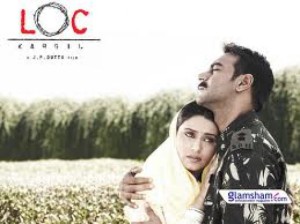 The dialogs have been written by J.P. Dutta’s father, late O.P. Dutta (who passed away on 09.02.2012) and they are damn impressive at several places. Still in such a long movie, the number of punching dialogs is quite less. Speaking something about the effort of the cinematographer will be trying to show light to the sun. Even the scenes taking place in the night are pretty clear on the screen and highly emphatic. Technically this movie is just superb. All the action sequences are pretty realistic.
The dialogs have been written by J.P. Dutta’s father, late O.P. Dutta (who passed away on 09.02.2012) and they are damn impressive at several places. Still in such a long movie, the number of punching dialogs is quite less. Speaking something about the effort of the cinematographer will be trying to show light to the sun. Even the scenes taking place in the night are pretty clear on the screen and highly emphatic. Technically this movie is just superb. All the action sequences are pretty realistic.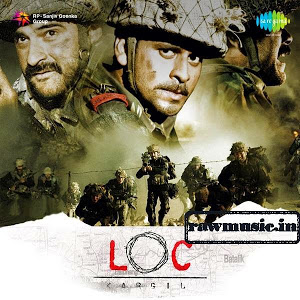 Anu Malik’s music with Javed Akhtar’s lyrics could not top up the charts but if you just listen to the songs peacefully and patiently, you will feel the quality of both the words and the tunes. The songs are quite long because the director had to accommodate the scenes of several actors while the song was continuing but they are highly patriotic as well as touching. My favourite is Seemayen Bulayen Tujhe Chal Raahi. But the other songs – Main Kahin Bhi Rahoon Har Kadam Har Ghadi, Pyar Bhara Geet Koi Dekho Piya Tumko Gaana Hi Hoga, Aao Jo Laut Ke Tum Ghar Ho Khushi Se Bhara etc. are also impressive and perfectly in line with the mood and the genre of the movie.
Anu Malik’s music with Javed Akhtar’s lyrics could not top up the charts but if you just listen to the songs peacefully and patiently, you will feel the quality of both the words and the tunes. The songs are quite long because the director had to accommodate the scenes of several actors while the song was continuing but they are highly patriotic as well as touching. My favourite is Seemayen Bulayen Tujhe Chal Raahi. But the other songs – Main Kahin Bhi Rahoon Har Kadam Har Ghadi, Pyar Bhara Geet Koi Dekho Piya Tumko Gaana Hi Hoga, Aao Jo Laut Ke Tum Ghar Ho Khushi Se Bhara etc. are also impressive and perfectly in line with the mood and the genre of the movie.
As said earlier, the complete movie appears like a gigantic effort, a Herculean task performed by J.P. Dutta and his team. It’s full of pluses. Then why did it flop on the box office ? In fact, Mr. Dutta should have (and might have) realized that it was pretty difficult for such an excessively long (more than four hours duration) war-based movie to gain commercial success. Still he took the risk at the call of his heart. This decision of his itself speaks volumes of his courage and patriotism.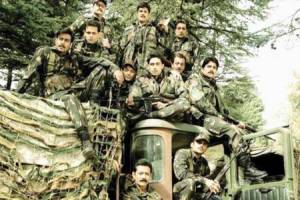 In my view Mr. Dutta himself committed two major mistakes which he should have avoided. Firstly, he has shown the soldiers mouthing highly obscene abuses. He had not done so in Border (1997) and it was correct. In this movie, on one hand, the soldiers are getting enthusiasm through religious slogans like Raja Ramchandra Ki Jai, Durga Maata Ki Jai and Jai Mahakaali whereas on the other, they are mouthing so bad words that the females (and also the decorous males) may find it difficult to keep their ears open. Swearings of mother and sister have been mouthed so freely that the decency level has come down to very low. Though such words have been partially beeped, yet it can be understood with ease in each such case what is the complete word. This minus point has snatched the characteristic of a family movie from it. Just like the cops, the soldiers also mouth dirty words, it’s a reality but should every reality be shown in the movie ? There are even much more disgusting realities associated with the military. Can the filmmaker gather the courage to show them also on the screen ? In the ending scenes, Colonel Y.K. Joshi (Sanjay Dutt) asks his subordinates to respect the dead bodies of the Pak soldiers. Then was it necessary to show disrespect to the mothers and sisters of the soldiers of either side ? Patriotism is not enriched by expletives Mr. Dutta.
In my view Mr. Dutta himself committed two major mistakes which he should have avoided. Firstly, he has shown the soldiers mouthing highly obscene abuses. He had not done so in Border (1997) and it was correct. In this movie, on one hand, the soldiers are getting enthusiasm through religious slogans like Raja Ramchandra Ki Jai, Durga Maata Ki Jai and Jai Mahakaali whereas on the other, they are mouthing so bad words that the females (and also the decorous males) may find it difficult to keep their ears open. Swearings of mother and sister have been mouthed so freely that the decency level has come down to very low. Though such words have been partially beeped, yet it can be understood with ease in each such case what is the complete word. This minus point has snatched the characteristic of a family movie from it. Just like the cops, the soldiers also mouth dirty words, it’s a reality but should every reality be shown in the movie ? There are even much more disgusting realities associated with the military. Can the filmmaker gather the courage to show them also on the screen ? In the ending scenes, Colonel Y.K. Joshi (Sanjay Dutt) asks his subordinates to respect the dead bodies of the Pak soldiers. Then was it necessary to show disrespect to the mothers and sisters of the soldiers of either side ? Patriotism is not enriched by expletives Mr. Dutta.
Secondly, he has tried to include as many incidents from the Kargil war as possible in the movie (still he could not include all such battles covered in that war) forgetting that the movie has to be completed within a reasonable time-duration. The fact that he overlooked is that unlike Border which was based on a particular battle in the 1971 war, the canvas of this movie was extremely large and hence the temptation to cover everything had to be kept under check. Besides, we all know that the soldiers away from their homes miss their families and their beloved and vice-versa. This is an aspect which fills the gaps in a war-based movie with sentiments and tender feelings. However when there are so many characters, all of them cannot be accommodated in common songs. Mr. Dutta’s attempt to do so have not only made the songs extremely long but also monotonous. He could have covered some characters in one song and some others in a different one, instead of including all in all the songs. It has tilted the narrative towards repetition and boredom.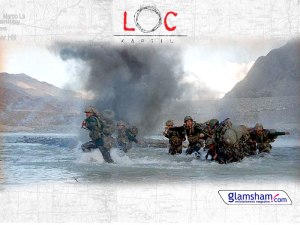 In the end, J.P. Dutta has shown the families of only some of the dead and the living soldiers and not all (the families of Ashutosh Rana, Puru Rajkumar, Karan Nath, Naagarjuna etc. have not been shown in the end) which also seems to be improper. Besides, Mr. Dutta himself could have reduced the duration of the movie through careful editing (he only has edited it). The distributors and the exhibitors removed several scenes on their own (so that they could arrange four shows instead of three only in a day) which killed the momentum of the movie and diluted its impact.
In the end, J.P. Dutta has shown the families of only some of the dead and the living soldiers and not all (the families of Ashutosh Rana, Puru Rajkumar, Karan Nath, Naagarjuna etc. have not been shown in the end) which also seems to be improper. Besides, Mr. Dutta himself could have reduced the duration of the movie through careful editing (he only has edited it). The distributors and the exhibitors removed several scenes on their own (so that they could arrange four shows instead of three only in a day) which killed the momentum of the movie and diluted its impact.
Despite its flaws and commercial failure, it’s to be acknowledged that J.P. Dutta has made an honest and highly impressive movie. It’s able to arouse love for your country in your heart. The complete unit of the movie including those appearing on the screen and those who worked behind the screen deserves a standing ovation from the audience.
© Copyrights reserved

मूवी के माध्यम से पता चलता है कि हमारे जवान किन मुश्किल परिस्थितियों में सिमा पर लड़ते है। वीर जवानों को सलाम।
आप ठीक कह रही हैं आदरणीया ज्योति जी । हार्दिक आभार आपका ।
I liked this movie…watched it a couple of times. Great review here… 🙂
Hearty thanks Maniparna Ji. I also like to watch it repeatedly.